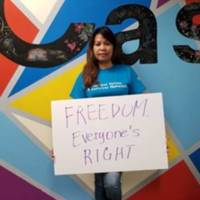
When I was a young girl in the Philippines I wanted to be in healthcare. We are poor and can’t afford healthcare and medicines and know that healthcare is a way out of poverty. We do 6-month contracts, that means after 6 months you have to find another job and when you reached the certain age and you didn’t get hired as a regular employee you will be jobless so if I didn’t get out of the Philippines I would either have to be married or I would be jobless. And I wanted to have a better life that can support my family if I get married. I was given the opportunity to care for my aunt in her 60s. She had a bedsore from diabetes, and I would comb her hair, bathe her, and provide for her needs. This gave me a feeling of doing good and being able to help others.
So, when I heard from a friend of a friend about working as a caregiver, I grab the opportunity. We assumed it was going to be a good thing that would allow me to continue helping others. She had me take classes through a private school for Taekwondo and they gave me a certificate and a black belt to come to the US on a sports visa.
Took the caregiver program and doing the work to come to the US. When I arrive in the US the woman said that I owed her 12,000 dollars and she needed my passport to get it stamped and I would work for her for 10 years. When the Licensing Division came and inspect us, they required the facility to have 8- hour shift only and a time sheet for every shift. So, my trafficker wrote down time sheets with her family members name and we were told to tell them we only worked 8-hour shifts and we had to move our stuff to the patient’s room, so it didn’t look like we lived there. She took us to get an ID and a social security number. We were taking care of people who had private insurance in a nursing home setting, the facility is only licensed for 6 patients, but we have 8.
I didn’t know about any of the US laws and thought I was working off the debt to bring me here. I got into Resilient Voices and realized there were a lot of us from the Philippines and CAST has clients mostly from the Philippines, Indonesia, and Mexico but we talk to each other and help each other out so this is probably just the communities we know and not the reality of people being trafficked in California. Resilient Voices and the National Survivor Network have 74 people in the state of California who were trafficked in California. We were trafficked in nursing homes, fields, hotels, and all throughout the state. We are from 18 to 82 and we are male and female clients. Some of us were trafficked from as young as 2 and into our 82.
Within the US human trafficking narrative, the overarching theme is domestic, sex-trafficked women and children, in need of rescue; ignoring the complex intersections of this pertinent issue.
Labor trafficking is not as simple as one might want it to be. We cannot ignore the ways in which we harm individuals across the globe and pretend it doesn’t happen in our backyards. We can and must do more to protect the labor that goes into everything we consume. California had a chance with AB 865 to address training that impacts foster care families in California to train them on labor trafficking and how it effects their kids—the labor piece was removed. We keep assuming it doesn’t affect us. We are here in this state doing the work to raise the awareness of how it impacts the state and how we can do better.
Narrative as told to the Little Hoover Commission, Public Hearing on Labor Trafficking









